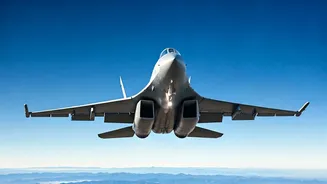The AI Revolution
The rapid advancement of artificial intelligence is transforming multiple sectors, including defense. AI's integration into military technology marks a significant
shift, especially in aerial combat. The development of AI-powered jets indicates a move towards autonomous systems that can perform complex missions with minimal or no human intervention. These aircraft are designed to potentially revolutionize the way wars are fought, emphasizing speed, precision, and reduced reliance on human pilots. The concept of jets taking off like rockets highlights their unique capabilities and the potential impact on defense strategies worldwide. This shift reflects a strategic evolution in military technology, aiming to enhance operational effectiveness and efficiency on the battlefield. The ongoing developments and deployments of AI in the military raise crucial discussions on the future of warfare and the ethical considerations involved in autonomous weapons systems.
No Pilot Required
One of the most striking aspects of this new technology is the potential elimination of human pilots. The AI jets are designed to operate autonomously, eliminating the need for runways and human control. This feature significantly enhances operational flexibility, allowing aircraft to be deployed rapidly in various challenging environments. The ability to launch and operate without the limitations of conventional runways makes these jets adaptable to a wide range of operational scenarios. This advancement could transform traditional air bases and potentially shift the dynamics of air operations. This feature could also reduce the vulnerability of aircraft to enemy fire, as they would be less reliant on traditional, exposed airfields. This shift towards fully autonomous aircraft presents both technological advantages and complex strategic implications for future military operations and tactical decision-making.
Striking Without Mercy
The implementation of AI in jets also brings up discussions regarding the nature of warfare. The capability to strike targets with precision and speed is a key feature of these autonomous aircraft. The capacity to engage in offensive operations without human oversight raises significant questions about accountability, ethics, and the role of humans in the decision-making process. The use of 'no mercy' suggests an intensity and efficiency that could dramatically reshape the characteristics of combat. The speed with which these jets operate may make them more lethal than traditional piloted aircraft. These developments raise critical concerns about the rules of engagement and the potential for unintended consequences. As AI technology continues to advance, the international community faces the challenge of establishing clear guidelines and frameworks to ensure the responsible use of autonomous weapons systems.
















